Becoming Montessori
The blog of the Montessori Center for Teacher Development
My Personal Experience with MCTD
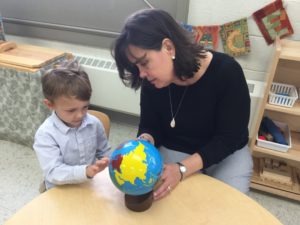
By Diane Palazzi
My Montessori journey began three years ago, when I decided that I might be ready to go back to work after being a stay-at-home mom for twelve years. Prior to having children, I had worked as a Museum Educator for over ten years. Through that work, I gained a strong appreciation for the value of hands-on learning and providing students with opportunities to learn about subjects that they are excited about. A friend had suggested that I consider teaching at a Montessori school, based on my beliefs about how kids learn best. She thought I would enjoy that type of educational environment. After doing some research, I found the Montessori Center for Teacher Development (MCTD) program, and decided to apply.
The first step in the application process was to do an observation at a local Montessori school. That first observation was eye opening. From the moment I stepped through the door and observed the students quietly concentrating and working on many different lessons at the same time with gentle and encouraging guidance from their teacher, I was hooked! I knew nothing about the Montessori Method, but what I did know was that any method of teaching that kept the children so engaged and clearly happy to be at school was a method of learning that I wanted to know more about.
I was very excited to learn that the MCTD program provided a certification to teach students ages 2 ½ to 6 years old because I have always found myself being drawn to the natural curiosity and enthusiasm that young children demonstrate in the classroom when they are provided with the right opportunity and environment for learning. Of course, along with my excitement, I also had many questions and concerns about going back to school. How would I balance going to school while also handling my many responsibilities at home? Would I remember how to write a research paper and have enough confidence in class to present lessons? Luckily, with the support of my family, the other Adult Learners in my cohort, and the truly wonderful MCTD staff, I have been able to successfully navigate this new chapter in my life.
When I began the MCTD program during the summer of 2017, my plan was to continue to stay at home with my children while completing the Academic Phases and go back to work during the fall of 2018 when I began my Practicum. Plans changed though, when an opportunity presented itself, and I was hired as an Assistant Teacher at a local Montessori school. I began working that September. I cannot express strongly enough how helpful it was for me to be taking courses and learning more about the Montessori Method, while at the same time being able to observe and apply what I was learning at MCTD in an actual Montessori classroom. I was hired as an ‘on-staff substitute assistant’, which meant that I was able to observe many different classrooms and styles of teaching. I have always been a strong promoter of the hands-on approach to learning, and I found that as an Adult Learner, this hands-on learning was also the best method for me!
The Montessori courses that I took during the Academic Phases of my program started with a very thorough course about who Maria Montessori was and how her beautifully created didactic learning materials truly prepared the students to be successful and to gain a love for learning. I think it is impossible to really understand the Montessori classroom before learning about Maria Montessori’s background and her philosophy. When I think back to my first few weeks and months in the classroom as an Adult Learner, I realize just how little I knew and how much I have learned about this remarkable woman and about what she found to be the best way to work with children.
During the Practicum Phase of my program, I continued to learn more every day. My Supervising Teacher provided me with endless opportunities to present lessons using the Montessori materials, as well as to develop new lessons to add to the classroom. I had once again found my passion for teaching, and I looked forward each day to observing students as they have those “ah-ha” moments when they independently succeed at understanding a lesson that they have worked so hard on in the classroom.
The MCTD program provides all of the guidance and support that is needed to be successful to Adult Learners who, like myself, have no prior knowledge of the Montessori Method or experience in a Montessori classroom. In addition to growing in my understanding about Montessori, I have also changed and grown personally as well. While juggling my many responsibilities, I have been forced to become more organized, to procrastinate less, and to be more confident both in and out of the classroom. I had forgotten how much fun it is to learn, and the great thing about being a Montessori Teacher is that the teachers never stop learning along with their students! There have admittedly been many late nights writing papers and last-minute shopping trips to stores to find the materials needed for a lesson, but looking back, it was all worthwhile. I now know that I have found what I want to do during the next phase of my career, and I look forward to what the future holds.
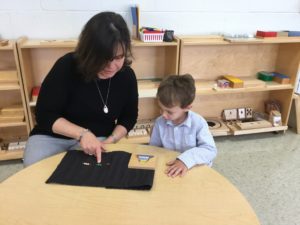
Co-Lead Teaching: Benefits, Challenges, and Rewards
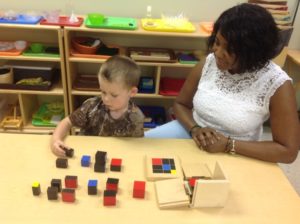
Today, we’d like to share the experience of Celia Arseneault, who completed our MCTD program and now teaches at The Montessori Children’s Academy in Short Hills. Her unique experience offers insight into different teaching options to consider after completing a Montessori Teacher Education Program.
When I embarked upon my career to become a Montessori teacher, I did so because of my children. I saw firsthand how each child learns differently and how the freedom of movement in a prepared environment empowers them to choose work of their own accord or to their own ability. In the words of Maria Montessori, children desire for us to “Help me do it by myself”. Little did I know that this journey would be one of self-discovery. This venture was made possible by MCTD and its caring and devoted staff. The support they provided kept me enthused and determined to succeed even in the face of challenges.
As an intern in the program and later as part-time Assistant Teacher, I learned how to create a prepared Montessori environment, the proper handling of Montessori manipulatives, and the importance of observation. With all this preparation and my Montessori certification in hand, one would think that stepping up to the position of a Head Teacher would be a simple matter. However, life has thought me that successful people often make success look effortless and that such a position was not to be entered into lightly because it affects the formative years and sensitive periods of a child. Therefore, when an opportunity to co-lead an afternoon class was presented by The Montessori Children Academy of Short Hills, I saw it as the perfect way to bridge a gap.
The gap I’m referring to is the learning curve or transition from Assistant to Head Teacher. As a co-lead, you share the responsibility and accountability of a classroom with another directress. Responsibilities such as Parent-Teacher Meetings, monthly newsletters, classroom management, and seasonal projects (such as Mother’s Day gifts) are made more manageable and can be more successful when undertaken with a partner. Co-lead is a shared time commitment and allows for exchange of ideas and collaboration; additionally, your co-teacher can provide back-up in the case of family emergency or short-term personal illness. The knowledge that you’re not in it alone is ever present and reassuring.
A co-lead experience certainly comes with its own challenges, as well, and these must be recognized. This type of teaching experience requires the two individuals involved to be respectful of each other’s style of teaching. So long as the teachers both show respect for the children, the classroom, and one another, they must acknowledge that differences in their teaching approaches may provide some balance for their students. Another challenge co-teachers may face is when other co-workers within the school, perhaps for ease of time, may be less inclined to discuss all matters with both teachers, which can lead to a breakdown in communication and cause confusion. In this instance, the teachers must make a concerted effort to share any important information with their co-teachers soon after they receive it. Still another consideration when co-teaching is if teachers have different ideas on how to present a lesson. This type of situations must be resolved if they are to present a united front, and it is usually best if teachers ‘tour’ their classroom together to discuss how they present lessons with the materials. Most importantly in a co-lead situation, the work load must not fall too heavily on one individual as resentment will surely brew and concerns of economic inequality can become a factor. While there are challenges, the best method to address them is to begin the co-teaching experience with open communication and to continue keeping that communication flowing honestly and respectfully throughout the year.
Co-lead teachers may find themselves in a situation where one of the directresses may be senior to the other. This type of relationship can prove to be a wonderful a mentorship where there is the passing down of a wealth of experience and information regarding children’s development. The co-lead experience might also be a mutual exchange of currently trending ideas with teachers who are of the same experience level. Either way, both teachers are the wiser as a result of working with a partner. It has been my experience that a joint venture such as this can be the most helpful in terms of developing experience for a new teacher, and it certainly prepares one for the things that lay ahead. A successfully engaged co-lead year essentially bridges all the gaps and can be advantageous if nurtured and handled with respect, grace, and courtesy…the Montessori way.
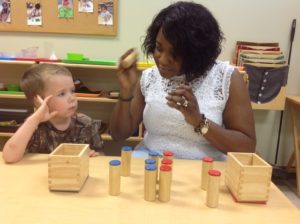
An MCTD Alumna Experience
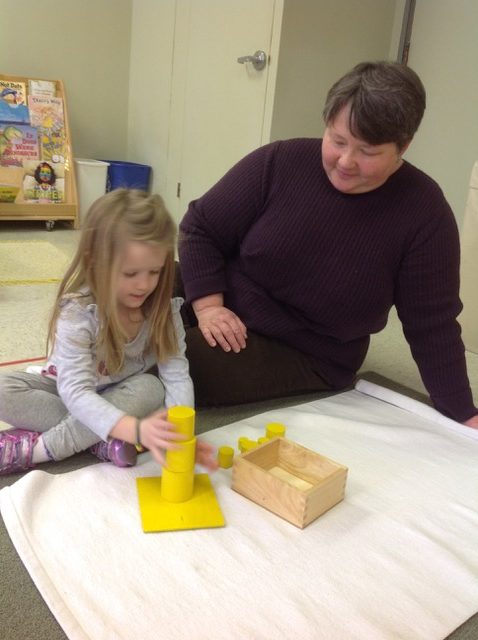
This month, we’d like to introduce you to one of our MCTD alums, Katherine Emire-Nieves. Katherine completed the MCTD program in 2018 and is currently a Montessori teacher at the Short Hills campus of The Montessori Children’s Academy in New Jersey. Katherine is a perfect example of how the Montessori philosophy is really a way of life. She first entered the Montessori community as a parent of a Montessori student, but then chose to further her understanding of the complete philosophy through training in our TEP, ultimately achieving her goal not only to live a Montessori life with her own family, but also to share the beauty of Montessori with others as a teacher. Here we present Katherine’s words about her experience, which she was happy to share to provide inspiration and insight to anyone who might be seeking to join a Montessori community of their own.
I believe that Montessori finds you. While I could explain the very indirect path which led me to getting my Montessori certification, in the end, it boils down to choosing to align myself with a set of educational values which I strongly believe in. I was first a Montessori parent, and I am now a Montessori teacher, because I respect children and I know that each and every child in this world deserves to be educated in a loving, caring environment where his or her needs are met and the child’s natural, inborn love of learning can be nurtured and inspired. The Montessori Method goes beyond that and includes a unique and proven method for helping the child create himself intellectually as he is innately, spiritually, inclined to do. Montessori preschool is no ordinary school, nor is it a form of daycare. Its unique manipulatives and lessons offer children a myriad of ways in which to learn practical skills, to gain an understanding of the world around them and the culture of which they are a part, and to learn language, math, and science. In the special Montessori environment, the child learns how to focus and concentrate. Children come to understand how they should be treated and how to treat others. They discover how to be both independent and responsible. To witness this learning is to experience the extraordinary; to guide a child in this learning environment is to be richly rewarded.
For anyone interested in the Montessori Method, I will say this: it is an amazing educational model created by a genius with a keen mind and a tireless commitment to the spiritual well-being of children and the future of humanity. The Montessori Center for Teacher Development strives to uphold the highest Montessori ideals when educating its Adult Learners. It provides a quality Montessori education for its trainees, in alignment with the standards set forth by The American Montessori Society. Its staff of experienced Montessori educators is positive and supportive. MCTD has the added benefit of being associated with three Montessori schools, which often provide a training ground for Adult Learners doing their internships, as well as future potential job opportunities for graduates.
My own personal experience with this training program has been one of tremendous growth, filled with challenges and enjoyment. It has been both a wonderful and at times, frustrating learning experience. The Montessori philosophy is inspirational. Its values of practical knowledge and respect (for oneself, for others, for the Montessori materials, and for the environment within and outside of the classroom) made me feel at ease, as they are in alignment with the values of my upbringing. Yet, mastering knowledge of the sheer volume of core Montessori works, as well as retraining myself to slow down in the classroom and refrain from hindering the children’s independence, has required a concerted and conscious effort on my part. Learning how to be the “Directress” of a Montessori ‘prepared environment’ takes time and hard work, and it requires the shedding of many of one’s own habits and expectations for the purpose of a higher ideal. While challenging, I found MCTD to provide the support and guidance needed to both understand and succeed in learning the Montessori approach with children in the classroom.
Having come ‘full circle’, I truly appreciate my Montessori learning journey at MCTD. Whether I choose to move from my current position as a Teacher to become a Head Teacher in the future, or set my sights on other ways to constructively use my Montessori credentials, I am better for having become a part of the Montessori community and all the gifts it has to give.
